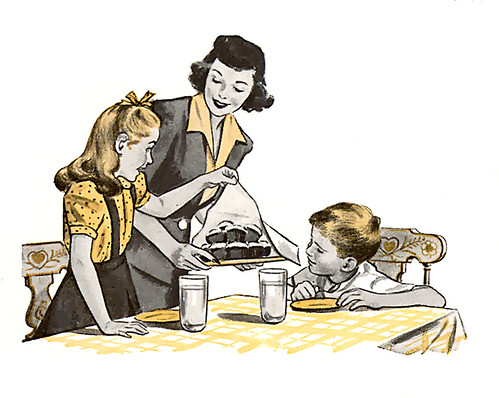OK, with all of the other commandments it is easy to see how they can be specifically applied to parenting, but the one against adultery stumped me for awhile. I really don't want to get into anything icky, although the creepiness of father-daughter patriarchy teachings is worth noting. But I believe that adultery is about more than sex--it is about breaking covenant and giving someone else a place that doesn't belong to them. It is choosing someone else over your spouse. In that context, there are some important parallels with parenting.
The parents that I know love their children dearly and value their relationships with their kids. Yet it is so easy fall into the temptation of allowing our desire to please other adults to edge out our covenant to our kids.
Why is it assumed that we should always side with any adult against our children if there is a conflict?
When our children are born, most of us are filled with tenderness and compassion for them. We want to meet their needs, even if it means sacrifice. I don't know of any parents who enjoyed letting their babies cry it out. Most of them tell me that their own heart was sobbing right along with their little one. But they listened to someone else who led their heart to be hardened against their baby. Others faced similar situations with weaning, circumcision, vaccination and other issues.
Samuel Martin has done some interesting research and found that many mothers have a heart that was inclined to gentle discipline, and that they felt uneasy or distressed at the thought of spanking their children. Ultimately, if they did go on to spank, it was often because of pressure from others, whether family, friends, church or society in general.
What parent of a toddler hasn't been in a public situation where the child is having a meltdown and we feel temptation to parent for the crowd? Recently a missionary friend was visiting, and described a church service where she was on the platform with the eyes of the entire congregation trained on her. Just at that moment, her three year old began to act...well, three. She could see the expectations on some of the faces to punish him into relative quietness (my snort here--like you can really punish a three year old into being quiet! The ones I have seen typically get louder). Instead, she smiled and took him in her arms and comforted him. She politely expressed to the congregation, "My first ministry is always to my family."
It is hard for some parents to choose between their children and protecting their image of a perfect family. I have seen some of my dear friends be rejected by their families in favor of their abusers once they decided to get out of their marriage. Some of those parents were seduced by the manipulation of the abuser or bribed with promises of more access to their grandchildren. Other friends were abandoned by their families when they came out. All of those parents broke their covenant to their children because they placed a higher priority on their own rightness.
Marriage vows are pretty well defined, but we don't have the same ceremony when we become parents. Honestly, though--shouldn't our commitment to the our vulnerable, helpless children who are a part of our family because of our own choices entail just as much love, and promises of faithfulness, to cherish them? And shouldn't our responsibility to them come before our choice to please people outside of our family?
It is difficult to forsake the parenting book gurus, the callous opinions of preachers, doctors, friends and more to be faithful to our own hearts. But it is still worth doing. As a daughter, grand daughter and daughter in law of pastors, I echo my friend Femke. Our commitment should always be to our family over pleasing anyone else. As Eli learned, very little matters if you haven't been able to reach your own children. There will always be judgmental stares and disapproving sniffs over our parenting. Our covenant is to our families, and our choice should always be for them.
 |
| Image credit: Terence Yim on Flickr |
The parents that I know love their children dearly and value their relationships with their kids. Yet it is so easy fall into the temptation of allowing our desire to please other adults to edge out our covenant to our kids.
Why is it assumed that we should always side with any adult against our children if there is a conflict?
When our children are born, most of us are filled with tenderness and compassion for them. We want to meet their needs, even if it means sacrifice. I don't know of any parents who enjoyed letting their babies cry it out. Most of them tell me that their own heart was sobbing right along with their little one. But they listened to someone else who led their heart to be hardened against their baby. Others faced similar situations with weaning, circumcision, vaccination and other issues.
Samuel Martin has done some interesting research and found that many mothers have a heart that was inclined to gentle discipline, and that they felt uneasy or distressed at the thought of spanking their children. Ultimately, if they did go on to spank, it was often because of pressure from others, whether family, friends, church or society in general.
What parent of a toddler hasn't been in a public situation where the child is having a meltdown and we feel temptation to parent for the crowd? Recently a missionary friend was visiting, and described a church service where she was on the platform with the eyes of the entire congregation trained on her. Just at that moment, her three year old began to act...well, three. She could see the expectations on some of the faces to punish him into relative quietness (my snort here--like you can really punish a three year old into being quiet! The ones I have seen typically get louder). Instead, she smiled and took him in her arms and comforted him. She politely expressed to the congregation, "My first ministry is always to my family."
It is hard for some parents to choose between their children and protecting their image of a perfect family. I have seen some of my dear friends be rejected by their families in favor of their abusers once they decided to get out of their marriage. Some of those parents were seduced by the manipulation of the abuser or bribed with promises of more access to their grandchildren. Other friends were abandoned by their families when they came out. All of those parents broke their covenant to their children because they placed a higher priority on their own rightness.
Marriage vows are pretty well defined, but we don't have the same ceremony when we become parents. Honestly, though--shouldn't our commitment to the our vulnerable, helpless children who are a part of our family because of our own choices entail just as much love, and promises of faithfulness, to cherish them? And shouldn't our responsibility to them come before our choice to please people outside of our family?
It is difficult to forsake the parenting book gurus, the callous opinions of preachers, doctors, friends and more to be faithful to our own hearts. But it is still worth doing. As a daughter, grand daughter and daughter in law of pastors, I echo my friend Femke. Our commitment should always be to our family over pleasing anyone else. As Eli learned, very little matters if you haven't been able to reach your own children. There will always be judgmental stares and disapproving sniffs over our parenting. Our covenant is to our families, and our choice should always be for them.






